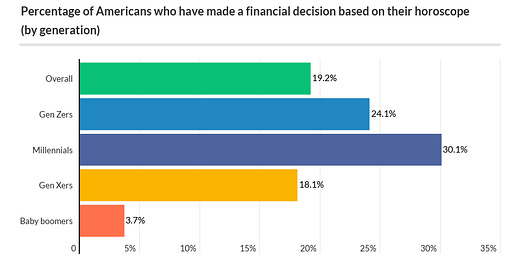Financial astrology is suddenly trending. Does it work?
How to use a financial horoscope to make investment decisions.
Did you know that in the United States, nearly 20% of Americans (19.2%) have made a financial decision based on their horoscope? And that an additional 30.6% are considering doing so?
In fact, about 32% of Americans say they have used or would consider using their horoscope as a financial guide.
Millennials are the most likely to base financial decisions on horoscopes, with 30.1% reporting they've done so, while 24.1% of Gen Zers have made similar decisions influenced by horoscopes.
The most common horoscope-influenced financial choices were:
Saving more money (42.1%)
Splurging (33.5%)
Buying or selling stocks (23.1%)
Changing jobs (23.1%)
One TikToker interviewed by Fortune described scanning the market in the morning and then using tarot cards to confirm her trading decisions. Stefaniya Nova, who goes by @blonderichwitch on TikTok, is a 25-year-old living in New York City using astrology, tarot, and “intuition” to guide her day trading.
“After scanning the market from 8:30 a.m. till 9 a.m. and picking the stock I’ll be trading that day—today it was Amazon—I do a single card pull to confirm my decision or get guidance,” she says in one video. “Today I pulled the Ace of Cups, which represents abundance; this gave me the needed assurance to trust in my strategy.”
This isn’t limited to the US, either. In the UK, a Barclays study found similar things:
10.2 million Brits check horoscopes.
32% of Brits do it at least once a month.
And 55% of those reading their horoscope admit that it influences their financial decisions.
As you can imagine, there is a growing number of providers ready to service this need.
For example, Business Today has a daily financial horoscope section which covers things like the stock market, career, and general business outlook. Others, like the Bullandmoon app, claim to to offer personalized stock and investment advice based on a user's star sign. These apps match users with stocks using "proprietary financial astrology," which takes into account the positions of the planets, sun, and moon at the time of both the user's birth and the company’s incorporation. For example, an Aries user might receive a suggestion that Cisco Systems is a "perfect match" with 100% compatibility.
There are even funds that use astrology in their investment theses. One such fund is the appropriately named Astrologers Fund. Apparently, it posted double-digit returns since inception.
What does science say about financial astrology?
As you can expect, scientists view financial astrology as pseudoscience. Here are some of their concerns:
No consistent methodology among practitioners;
A reliance on confirmation bias rather than rigorous analysis;
And no plausible mechanism to explain how planetary positions could possible influence financial markets.
This being said, some studies did find a weak correlation between moon cycles and financial markets. The theory is that the moon's phases correspond to market highs and lows, similar to their effect on ocean tides. Investors aim to buy during the moon’s waning phases (when prices are low) and sell during the waxing phases (when prices rise). Eclipses, in particular, are seen as periods of unpredictability.
A 20-year study by the University of Lausanne found lunar cycle strategies outperformed by an average of 3.3% per year.
However, this wasn’t consistent– although some zodiac signs appeared to perform better than others, statistical tests show no significant evidence that zodiac-based investment strategies can consistently improve returns.
Another study, done in 2006 by researchers at the University of Michigan, found slightly lower stock returns around full moons compared to new moons across a 48-country portfolio, amounting to a 3-5% annual difference.
The authors of the Michigan study point out that the lunar cycle has little effect on economic or social activities in modern life, making it hard to explain any connection between moon phases and stock returns. They argue that studying this connection is an excellent way to test if investor behavior impacts asset prices, especially since there’s no clear, rational cause. If lunar phases influence mood, this could affect how investors act and value stocks, with lower stock values expected during full moons due to negative mood. They suggest that investor mood follows a cycle, peaking at the new moon and dipping at the full moon. The study found no link between the lunar effect and changes in stock volatility or trading volume, pointing more to mood or behavior as the cause.
The researchers noted that this effect appeared independent of other typical market influencers, such as economic indicators and calendar events, though they also acknowledged the possibility of a random correlation.
What could explain financial astrology (when it does somehow work)?
The most obvious way financial astrology works is by confirmation bias. People tend to remember hits and forget misses when it comes to astrological predictions. Closely related to this is the phenomeon of apophenia – we’re just naturally inclined to see patterns, even where there may be none.
Like this viral loaf of lemon raspberry bread:
The other way financial astrology “works” if through the Barnum effect. Astrological descriptions often use vague, general statements that can apply to many people, leading to a false sense of accuracy.
For example, take Business Today’s daily horoscope today: “Ganesha says you may get a very good opportunity for financial gain.” Is there a day without some opportunity, somewhere?
Did you invest in iRhythm Technologies (IRTC), a loss-making company with barely $2B in market cap? It’s up almost 22% in the past 24 hours. That’s more than some of the most volatile crypto tokens out there. There went your “very good opportunity for financial gain”. Technically, Ganesha was right.
Now, you might think that these examples make financial astrology useless. That’s not really true. There is one way you can use financial astrology to become a better investor.
How should we use financial astrology?
The best (and maybe only) way to use financial astrology is to think of it as a “gut-feel indicator.” This is because knowing yourself matters most when investing.
Take the same Aries financial horoscope for today:
“Ganesha says you may get a very good opportunity for financial gain. However, you should be cautious to keep your financial progress stable”.
One Aries could read this and become concerned, while other could become excited. Accepting how we react is the first step towards becoming a better investor – if the first Aries can’t stomach market whipsaws, then a more balanced portfolio is the one for them. Basically, the financial horoscope is in this situation acts almost like a “virtual portfolio”.
A study on the role of emotion in decision-making looked at neurological patients with brain damage, and found that people who have their emotional brain centers damaged find it very difficult to make decisions. Far from being the opposite of reason, emotion helps us decide which path to take.
This is very similar to the concept of flipping a coin to make a decision. It’s not about the outcome – it’s all about how you feel when the coin is in the air. Do you hope for head or tails?
If astrology makes you more comfortable with investing, it may have value in helping you understand your tendencies and make decisions that align with your personality. If your risk appetite is low or you are suffering from analysis paralysis, maybe astrology can push you to take a chance to invest.
In a broader sense, astrology, fortune-telling, and tarot readings can affect how we feel and make decisions, particularly in high-stakes scenarios like investing. For those who are risk-averse, astrological insights provide reassurance. On the other hand, most horoscopes tend to be positive, which might create unrealistic confidence.
This is why you should only use these tools only to practice self-reflection and to understand yourself as an investor. And, of course, to have a bit of fun.
Have you ever checked your horoscope before investing? Or did you ever consider selling it all because of a particularly scary prediction?









